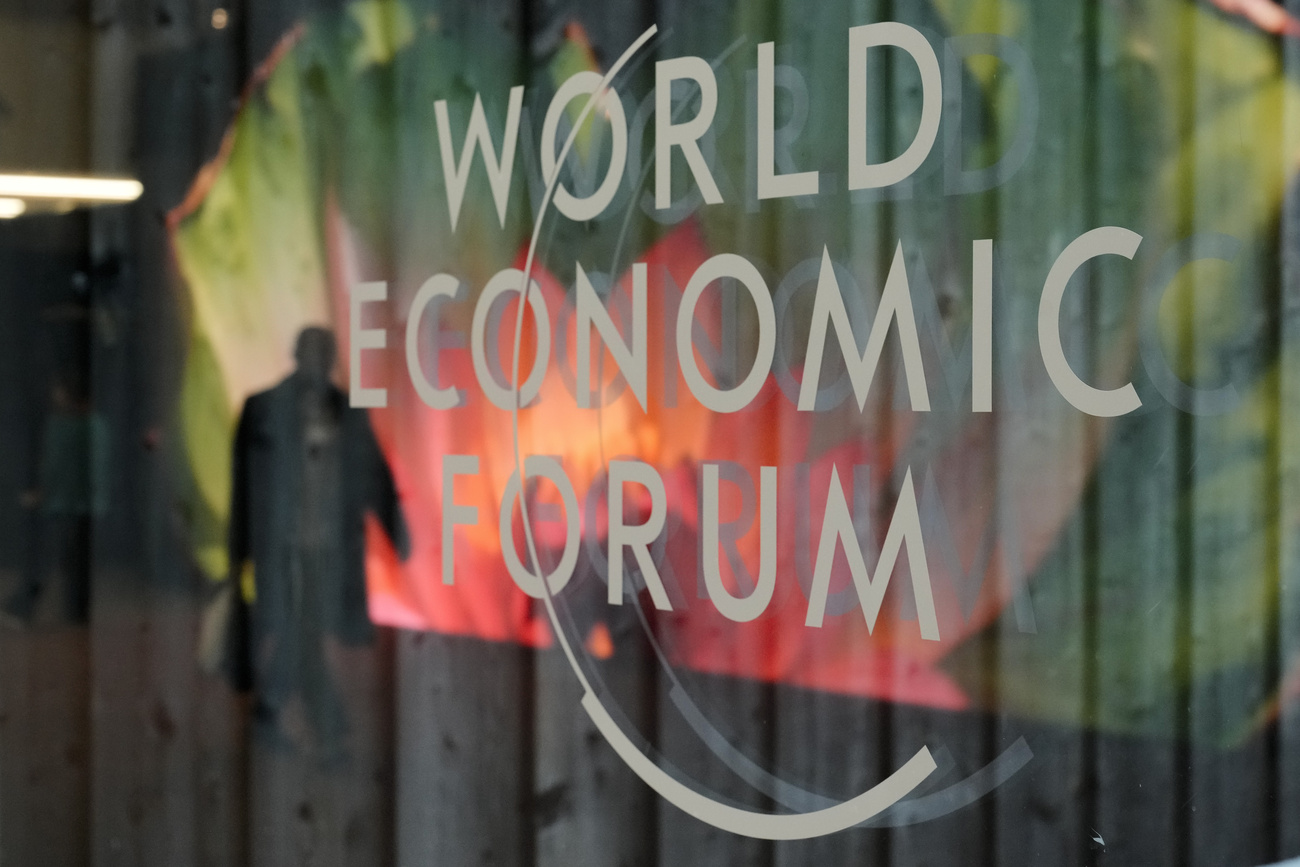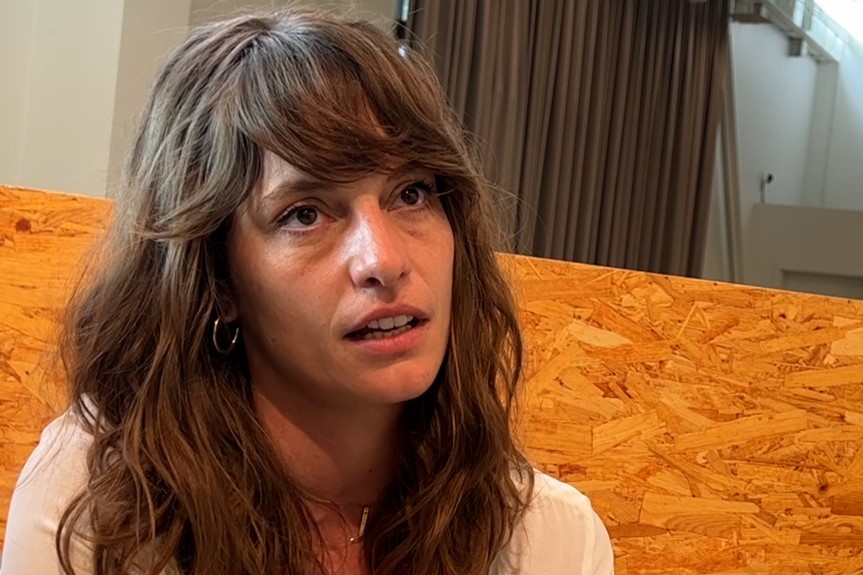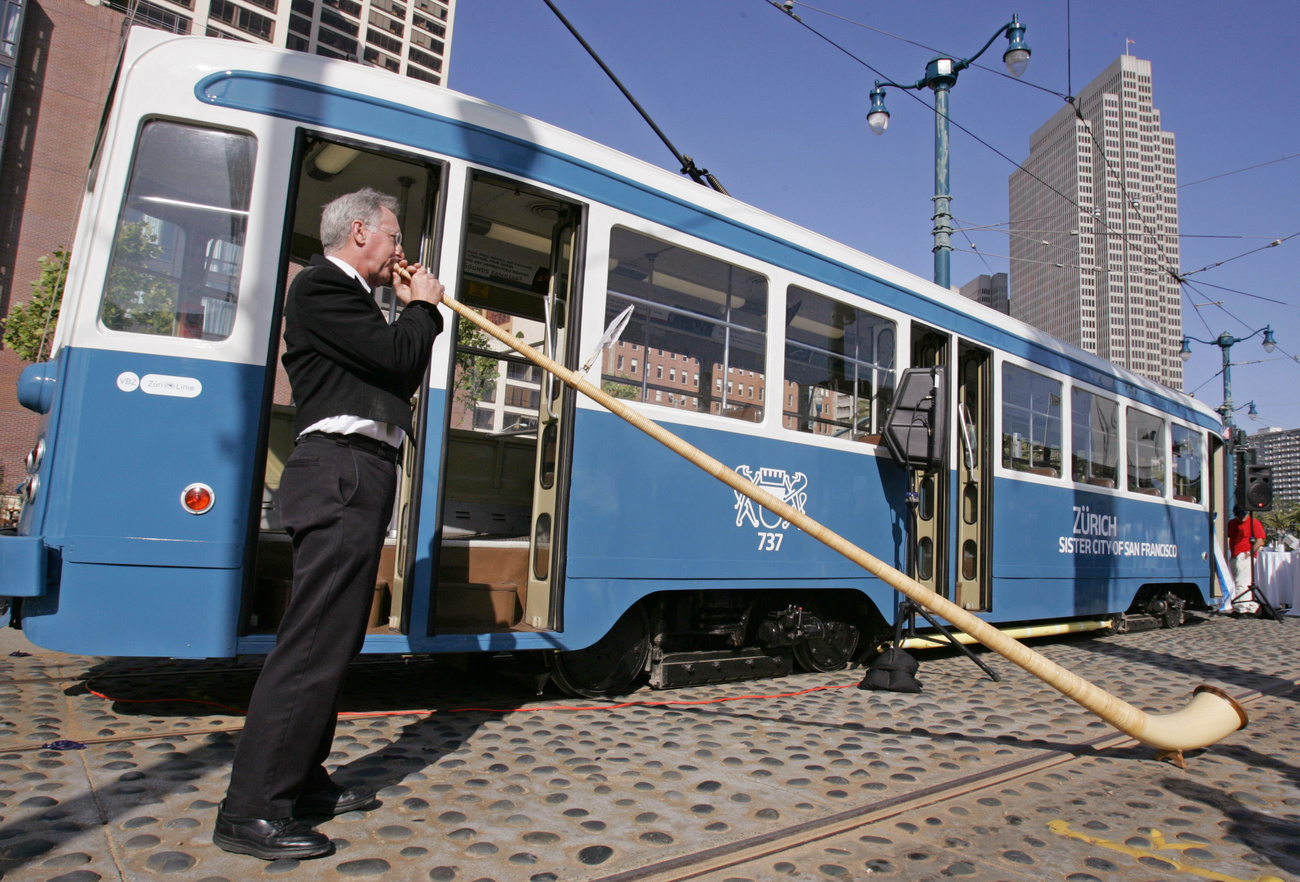
Emilia Pasquier, How Swiss ‘unicorns’ and start-ups are faring in California

More than 150 Swiss start-ups have received a boost from California entrepreneurship, and three of them are already worth $1 billion. This is a source of pride for Swissnex in San Francisco. SWI swissinfo.ch met its CEO, Emilia Pasquier.
“I’ve always worked at the intersection of innovation, science and politics,” says Emilia Pasquier. “And for me, California is a symbol of freedom and new ideas.”
Before arriving in San Francisco in September 2022, Pasquier spent four years working as an advisor to Alain Berset, then the Swiss interior minister. Before that, she ran Foraus, a participatory think tank on foreign policy.
>> In this short video Emilia Pasquier explains what young Swiss entrepreneurs can learn from Silicon Valley:
SwissnexExternal link, the Swiss “scientific consulate” in San Francisco, is 20 years old. It is part of a network that stretches from both coasts of the United States to Japan, via Brazil, India, China and Singapore.
“We welcome scientists, academics and start-ups, as well as artists and foreign government delegations, who come here to be inspired by our model,” Pasquier says. And the competition is fierce: Austria and Italy have already set up similar structures.
Officially, Swissnex aims to “promote exchange and collaboration in the fields of education, research and innovation.” One look at the “wall of fame” in the San Francisco office gives this mission a very concrete meaning: there are more than 150 logos of well-established companies that arrived here when they were still start-ups. And three of them have become “unicorns” – companies valued at $1 billion (CHF860 million) or more.
For a full version of the interview, listen to our podcast the Swiss Connection.
MindmazeExternal link: Based on a decade of research and testing, MindMaze Pro is a neuro-rehabilitation platform for the upper limbs that uses proprietary 3D-motion tracking cameras to help patients recovering from traumatic injuries and those suffering from acute and chronic strokes.
NexthinkExternal link is the leader in digital employee experience management software. The company provides IT managers with insights into employees’ daily technology experiences at the device level, enabling IT managers to move from reactive problem-solving to proactive optimisation.
ScanditExternal link has developed computer-vision technology that enables smartphones and other devices to scan barcodes and perform other data-capture tasks. The company has been recognised as a leader in the mobile computer vision industry.
Two minutes to convince people
“We see these young entrepreneurs with great ideas arrive, and for a fortnight we train them in the Silicon Valley mindset,” Pasquier says. Even if Switzerland regularly ranks as the most innovative country in the world, Hewlett-Packard, Apple, Intel, Facebook, Tesla, Netflix, Twitter and Google were all born in the Valley – that narrow strip of land some seven kilometres south of the city, between San Francisco Bay and the Pacific Ocean.
And yet, Pasquier notes, “in terms of research, economy and creativity, Switzerland has a density roughly the same as that of Silicon Valley.” It also has two of the best technical universities in the world.
So what do Swiss geniuses lack? Perhaps a certain mindset. “When you come here having pitched for business in French-speaking Switzerland and thinking you’re going to try out German-speaking Switzerland, you quickly realise that’s not enough,” she says. “You have to think much bigger.”
Nor will it be enough to tell a potential investor or partner that your product has Swiss Made quality. Innovators have to explain that their idea is going to change the world and show they are 300% committed to it. And no, it’s not a myth: “You have two minutes to convince people,” Pasquier says.

A rich stream of dollars
Of course, money also makes a difference. According to the financial information platform crunchbaseExternal link, California attracted $91.9 billion in venture capital investment in 2022. In comparison, the Swiss Venture Capital ReportExternal link gives a figure of $3.9 billion for the same year.
In the United States, by no means all of these funds come from traditional banks. And even less come from the state. This is the country where venture capital was born. As Pasquier explains, “a virtuous circle has been established in Silicon Valley. We have a huge number of successful entrepreneurs who have made money and are reinvesting it in new start-ups.”
Against this backdrop, the director of Swissnex was not really concerned by the bankruptcy in March 2023 of the Silicon Valley Bank, which specialised in financing start-ups. After the setback caused by the pandemic and an exceptional recovery in 2022, she sees it more as a “bump in the road” than a sign of possible decline. Because even if competition is fierce from other technology centres – in the US and around the world – Silicon Valley has nonetheless been the source of the new boom in artificial intelligence.

Two ‘next big things’
Like everyone else, the director of Swissnex is banking on artificial intelligence to be one of the “next big things” that will attract talent and capital. But there is another: climate technologies.
By way of illustration, she cites the donation of $1.1 billion made by the investor couple John and Ann Doerr to Stanford, the “think tank” of the Valley. This sum – the largest ever received at one time by the prestigious university – will be used to create a new school dedicated to sustainability, due to open in autumn 2024.
“When there is an alignment of private funds, public policy and research, all in a fairly concentrated ecosystem, things can happen very quickly”.
On the political front, the Biden administration passed an anti-inflation bill in 2022 containing a series of measures to reduce emissions and develop renewable energies and carbon capture technologies. For Pasquier, the signals are clear.
“When there is an alignment of private funds, public policies and research, all in a fairly concentrated ecosystem, things can move very quickly,” she says, adding there is “great hope” for the climate and the future of humanity – simply “because the world needs it.”
Beach life vs street life
That optimism and determination is typically Californian. Since moving to San Francisco, she has come to appreciate the special atmosphere that is so much a part of the city’s charm.
“On the street, someone will spontaneously say to you, ‘I love your shoes.’” In Switzerland, you’d immediately ask yourself, ‘What does he or she want from me?’, but here it’s normal,” says Pasquier, who has quickly adopted the “beach life” culture, as they say in California. “It’s surprising at first, but so nice.”
Also surprising – though not nice at all – is the impression, in certain areas of the city centre, of arriving in a post-apocalyptic film. On these streets, where one shop after another is closing, drug addicts haunt the pavements, haggard and staggering, in front of parks where children play behind fences.
Over the last ten years or so, fentanyl, a synthetic analgesic 50 times more powerful than heroin, has made its way out of hospitals and doctors’ surgeries and onto the streets. “This terrifying drug can kill you in six months,” Pasquier says.
>> Emilia Pasquier talks about counter-culture, the tech industry and poverty:
Open scenes
In the Tenderloin district, between the luxury shops of Union Square and the majestic city hall complex, there is an open drug scene at almost every crossroads, just like Platzspitz and Letten in Zurich in the 1990s.
Zurich, San Francisco’s twin city, could be the inspiration for the city, which has been overwhelmed by this problem. In mid-October 2023, Zurich Mayor Corine Mauch came with a delegation of people from the police, social services and health departments for a visit lasting several daysExternal link on the subject of drugs.

If Zurich has managed to control the scourge of drugs, why can’t San Francisco? The current mayor, London Breed, campaigned on a promise to end the war on drugs and create a system based on compassion and healing, a system which, according to Pasquier, could resemble “the Swiss four-pillar modelExternal link”.
But the realities on the ground are very different. “The United States does not have as developed a social system as most European countries,” Pasquier says. “Here, what the state doesn’t do is taken care of by communities, charities and churches.”
“You can find a job very quickly, but you can lose it just as quickly and end up on the street”, she adds. Homelessness is a national problem. But California, with its tolerance and mild skies, attracts more than its fair share. According to the 2020 census, the state is home to a third of the country’s 600,000 homeless. In San Francisco, there are around 8,000 homeless people, 1% of the city’s population.
The perception of marginality and drug addiction is also very different. Whereas in Switzerland we tend to see such people as victims, here people are quicker to assume they have chosen to be on the streets. While she refrains from “passing judgement on the issue”, Pasquier notes that for Americans, “the concept of individual responsibility is much stronger”.
Edited by Samuel Jaberg. Adapted from French by Catherine Hickley/gw

In compliance with the JTI standards
More: SWI swissinfo.ch certified by the Journalism Trust Initiative




























You can find an overview of ongoing debates with our journalists here . Please join us!
If you want to start a conversation about a topic raised in this article or want to report factual errors, email us at english@swissinfo.ch.